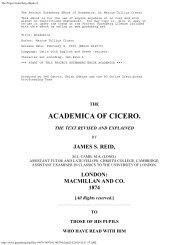From Farm House to the White House - 912 Freedom Library
From Farm House to the White House - 912 Freedom Library
From Farm House to the White House - 912 Freedom Library
You also want an ePaper? Increase the reach of your titles
YUMPU automatically turns print PDFs into web optimized ePapers that Google loves.
<strong>Farm</strong> <strong>House</strong> <strong>to</strong> <strong>the</strong> <strong>White</strong> <strong>House</strong>, by William M. Thayer 125<br />
condition <strong>to</strong> listen <strong>to</strong> his counsels. They were in <strong>the</strong> defiant state of in<strong>to</strong>xication, and refused <strong>to</strong> evacuate.<br />
They declared <strong>the</strong>mselves able and determined "<strong>to</strong> hold <strong>the</strong> fort."<br />
The hero of Monongahela was not <strong>to</strong> be defied in that way. He adopted immediate measures <strong>to</strong> drive <strong>the</strong> mob<br />
away, but was not successful. Finally, summoning his negroes, and organizing a campaign against <strong>the</strong>m, he<br />
forced <strong>the</strong>m <strong>to</strong> leave, though, Irving says, "It <strong>to</strong>ok a campaign of three days <strong>to</strong> expel <strong>the</strong>se invaders from <strong>the</strong><br />
premises."<br />
At ano<strong>the</strong>r time Washing<strong>to</strong>n was riding over his estate, when <strong>the</strong> report of a gun on <strong>the</strong> banks of <strong>the</strong> river, not<br />
far away, startled him. Turning his horse in <strong>the</strong> direction of <strong>the</strong> report, he soon discovered an interloper in a<br />
canoe, making havoc among <strong>the</strong> canvas-back ducks which were numerous on <strong>the</strong> river.<br />
"Stranger," he called.<br />
The hunter looked up.<br />
"By what authority are you trespassing upon <strong>the</strong>se grounds?"<br />
The only reply that Washing<strong>to</strong>n received was, <strong>the</strong> hunter aimed his gun at him as if <strong>to</strong> fire. But <strong>the</strong> owner of<br />
Mount Vernon had seen guns pointed at him before; and, nothing daunted, he dashed in<strong>to</strong> <strong>the</strong> river, shouting,<br />
"Fire if you dare!"<br />
Seizing <strong>the</strong> painter of <strong>the</strong> canoe, he drew it <strong>to</strong> <strong>the</strong> shore; <strong>the</strong>n, springing from his horse, he wrested <strong>the</strong> gun<br />
from <strong>the</strong> hands of <strong>the</strong> as<strong>to</strong>nished hunter.<br />
"I am <strong>the</strong> proprie<strong>to</strong>r of this estate," he shouted, seizing <strong>the</strong> fellow by <strong>the</strong> nape of his neck and pulling him out<br />
of his canoe, "and we will see whose rights are <strong>to</strong> be regarded."<br />
The hunter begged for mercy, promising <strong>to</strong> quit <strong>the</strong> grounds and never more trespass upon <strong>the</strong>m. Washing<strong>to</strong>n<br />
res<strong>to</strong>red his gun <strong>to</strong> him, and allowed him <strong>to</strong> depart without fur<strong>the</strong>r punishment.<br />
Mr. and Mrs. Washing<strong>to</strong>n were active and influential members of <strong>the</strong> Episcopal Church. Irving says:<br />
"The Episcopal Church predominated throughout <strong>the</strong> 'Ancient Dominion,' as it was termed. Each county was<br />
divided in<strong>to</strong> parishes, as in England, each with its parochial church, its parsonage, and glebe. Washing<strong>to</strong>n was<br />
vestryman of two parishes,--Fairfax and Truro. The parochial church of <strong>the</strong> former was at Alexandria, ten<br />
miles from Mount Vernon; of <strong>the</strong> latter, at Pohick, about seven miles. The church at Pohick was rebuilt on a<br />
plan of his own, and in a great measure at his expense. At one or o<strong>the</strong>r of <strong>the</strong>se churches he attended every<br />
Sunday, when <strong>the</strong> wea<strong>the</strong>r and <strong>the</strong> roads permitted. His demeanor was reverential and devout. Mrs.<br />
Washing<strong>to</strong>n knelt during <strong>the</strong> prayers; he always s<strong>to</strong>od, as was <strong>the</strong> cus<strong>to</strong>m at that time."<br />
One of Mrs. Washing<strong>to</strong>n's biographers says of her:<br />
"It is recorded of this devout Christian that never, during her life, whe<strong>the</strong>r in prosperity or adversity, did she<br />
omit that daily self-communion and self-examination, and those private devotional exercises, which would<br />
best prepare her for <strong>the</strong> self-control and self denial by which she was, for more than half a century, so<br />
eminently distinguished. It was her habit <strong>to</strong> retire <strong>to</strong> her own apartment every morning after breakfast, <strong>the</strong>re <strong>to</strong><br />
devote an hour <strong>to</strong> solitary prayer and meditation."<br />
Mount Vernon was a home of prayer, of course. The presence of guests, however distinguished, never<br />
modified <strong>the</strong> family devotions. These were among <strong>the</strong> essentials of good family government. In one of<br />
Washing<strong>to</strong>n's orders sent <strong>to</strong> England is <strong>the</strong> following:















